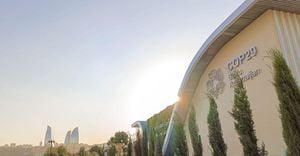North Korea and Russia are deepening their military cooperation, raising concerns among global powers as they navigate the complicated dynamics of modern warfare. Recent developments indicate North Korea might officially acknowledge troop deployments to support Russia's efforts in Ukraine, marking its formal entry as a participant in the conflict. This significant pivot has been noted by the Unification Ministry of South Korea, which has flagged signs of unrest among North Koreans, fueled by families expressing distress over the deployment news.
Reports suggest the Kim regime has been trying to keep these troop movements under wraps. Still, internal whispers have picked up, hinting at the human cost involved as casualties among North Korean soldiers increase. A senior official from the South Korean government expressed concerns, stating, "Casualties and deserters on the battlefield, combined with the growing burden of troop rotations, are expected to raise the likelihood of these issues reverberation within North Korea." The official indicated this situation could compel North Korea to concede to transparency about its deployments.
The timing of this escalation is notable—just after North Korean leader Kim Jong-un and Russian President Vladimir Putin signed a treaty establishing strategic military partnerships, which include mutual defense commitments. The signing followed several months of painstaking discussions, culminating earlier this month with both sides finalizing the ratification process. The agreement is expected to bolster North Korea's international standing, enabling it to extract military and economic advantages from this alliance.
North Korea’s calculations appear to involve more than just immediate military strategy. Analysts note the regime may see participation as solidifying its military alliance with Russia, as well as enhancing its political leverage. Should this partnership yield military technology transfers or operational insights, the benefits could extend well beyond the current conflict.
Concurrently, satellite imagery has unveiled expansion efforts at North Korea's February 11 Plant, pivotal for producing the KN-23 ballistic missiles, which have recently been utilized by Russian forces. This facility, located in Hamhung, is reportedly undergoing major upgrades, hinting at North Korea's intent to amplify its missile production capacity amid the backdrop of the Ukraine war. According to Rosenburrow, research suggests the facility has seen consistent growth since 2020, with new structures dedicated to missile assembly now taking shape alongside worker accommodations.
The facility is believed to manufacture both the KN-23 and KN-24 missiles—versions of tactical missile systems whose use has reportedly surged within the Russian arsenal during its military operations. This arms deal not only indicates mutual dependency between Pyongyang and Moscow but signals North Korea’s increasing role as a strategic supplier to Russia’s offensive capabilities.
The Group of Seven (G7) nations voiced strong objections to this military collaboration, describing it as detrimental to both European and Indo-Pacific security. After two days of talks, G7 foreign ministers affirmed their commitment to Ukraine’s sovereignty, warning of the escalated threats posed by the North Korean troop deployments. Their statements reflected the heightened anxiety surrounding the shifting power dynamics as North Korean personnel begin engaging directly on the battlefield.
Beyond just troop deployments, experts speculate about the potential exchange of military technologies between Russia and North Korea. The G7 also highlighted growing concerns over China's increasing support for Russia through the supply of dual-use materials. This complex interplay points to broader geostrategic shifts, threatening to upend existing security arrangements across both the European and Asian theaters.
Observers note the ideological alignment of North Korea with Russia, driven largely by shared adversarial views toward the West. The Ukraine invasion has starkly illustrated the potential for North Korea to draw closer to Russia, especially amid the isolation both countries face due to international sanctions. While this collaboration is driven by current needs, it raises questions about the longer-term ramifications for regional stability.
U.S. military analysts have expressed worry about the potential for war prolongation due to these enhanced cooperative measures. The influx of seasoned North Korean troops could serve as significant reinforcement for Russia’s struggling forces, potentially altering the frontlines of the conflict as both sides learn from their battle experiences.
Beyond merely supporting Russian military initiatives, North Korea anticipates economic advantages through this military assistance. Troop deployments to Russia may enable North Korean soldiers to earn wages, strengthening bilateral economic ties and assisting Pyongyang in circumventing existing UN sanctions. Such economic prospects offer enormous incentives for the regime to remain engaged with Russia, potentially rewriting the contours of North Korea's military-strategic calculus.
These developments also coincide with internal challenges facing the Kim government. Analysts from the Ministry of Unification warned of possible unrest stemming from troop casualties, signaling the regime's precarious grip on power. This highlights the difficult balancing act Kim must manage—propagandising strength and unity at home, whilst engaging militarily abroad—without provoking dissent among the ranks of the military or the general populace.
Last but not least, these developments could serve as catalytic to reconfigure alliances within the region. South Korean officials are increasingly concerned about what this collaboration might mean for regional geopolitics, especially as North Korea’s relationship with Russia tightens. Tensions are likely to escalate as allied nations ponder contexts of defensive posturing and any retaliatory measures necessary to counteract the shifting security dynamics.
Further complicity emerges from these geopolitics, as alliances reshape and historical grievances resurface. The interplay between North Korea’s military developments and the West's strategic responses creates multiple potential flashpoints for conflict, emphasizing the necessity for monitoring and diplomatic engagement as the situation evolves.



